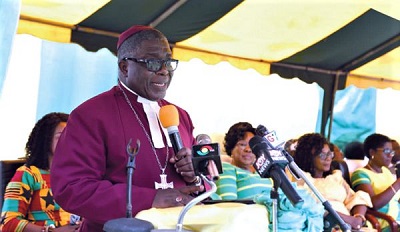The Most Reverend Dr Paul Kwabena Boafo, Chairman of the Christian Council of Ghana, says the ecumenical bodies will not rush the government to lift the ban on in-person church services.
The leadership, he said, would always reserve that prerogative for the government, and wait patiently for the State’s directive to reconvene for communal services.
The ecumenical bodies are the Christian Council of Ghana, Ghana Catholic Bishops, Ghana Pentecostal and Charismatic Council, Ghana National Association of Charismatic and Christian Churches and other faith-based organisations.
Speaking to the Ghana News Agency, in an interview in Accra, Rev. Dr Boafo, who is also the Presiding Bishop of the Methodist Church, Ghana, stated: “….We agree with the government that the sanctity of life is a priority, and so if the number of COVID-19 cases keep on rising and we have not ‘plateaued’ or seen a steady decline, we will say that let us keep to the ban until we see that the situation can be safely handled.
“We need to contain these things else, people might even fear going to church and get exposed to the virus if they think the situation is not manageable.”
The interview was to seek the position of the ecumenical bodies on the matter as opinions are divided among the clergy and some Christians on when and how to lift the ban, imposed by the Government on Monday, March 16, to contain the spread of the novel Coronavirus.
Some argue that the speedy return to in-person services would strengthen Christians in their faith and prayers to overcome the virus. Others also say the churches’ funds were drying up, making it difficult to pay church workers.
However, others argue that the services would expose members to the virus and defeat the Churches’ mission of saving lives; therefore, the virtual services should continue until it was very safe.
President Nana Addo-Dankwa Akufo-Addo has called for a stakeholder and citizens’ engagement towards recommending measures to relax some of the restrictions for living with the virus.
Rev. Dr Boafo told the GNA that the Christian leaders decided to fully support the Government’s restrictions on social gatherings and the temporary closure of the churches because they found it imperative for the country to contain the spread of COVID-19.
“It is important to note that addressing COVID-19 requires the whole of government’s and the whole-of-society’s response – and the Church, being a major stakeholder, is indispensable in the State’s overall COVID-19 response”.
Since the restrictions were imposed, he said, the Government from time to time met with the ecumenical bodies to deliberate the issues.
He disclosed that during their last meeting with the President, the leaders were asked to recommend preventive and containment measures towards the reopening of the churches in due course.
Subsequently, the guidelines had been presented to the President.
The Rev. Dr Boafo said since faith and science worked in tandem, the church leaders and the ecumenical councils consulted their health personnel in the Christian Health Association of Ghana to advise them.
Following the consultation, the guidelines were drafted and sent to the President on May 7.
The proposed strategies cover strict hygienic and hand washing protocols, properly-spaced sitting arrangements, wearing of facemasks, no handshakes, and no waving of handkerchiefs.
There could also be measures to take the temperatures of members before being allowed to enter church premises, while families could be made to sit together at church observing social distancing.
It also advised that Communion services, a Christian sacrament of sharing of wine and bread, should be done in a manner that prevented hand-to-hand transmission of the virus, while individual cups should be used to serve the communion.
Offerings and tithes could be paid via mobile money platforms or on site by dropping them in stationary bowls or baskets with wide openings.
The guidelines also proposed the intensive education of the congregation by selected trained members of the church.
Additionally, church services should be done in sessions to reduce the number of people that congregate at a time for worship.
“These are protocols that will help our wellbeing and so we encourage everybody to embrace them when the time comes,” Rev Dr Boafo admonished.
Meanwhile, the ban on public gatherings, as set out in Executive Instrument number 64, remains in force until May 31.
It forbids the holding of conferences, workshops, parties, night clubs, drinking spots, festivals, political rallies, religious activities, sporting events, funerals among others.
Additionally, all educational facilities private and public and mosques remain closed.
Ghana’ Covid-19 cases count stands at 7, 303, with 34 deaths as of May 26, the Ghana Health Service reported, on Thursday. There are 2,412 recoveries. Only one, the Bono Region, out of the 16, has no confirmed case.































